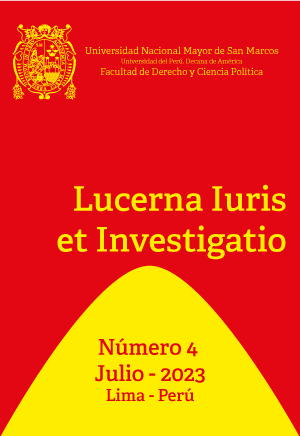Exceptions to the right of access to information from government control. Comparative analysis
DOI:
https://doi.org/10.15381/lucerna.n4.25177Keywords:
Access to information, Information reserve, transparency, Government control, Control reserve principleAbstract
The purpose of this article is to address the problem of access to public information, as a fundamental right of the citizen that must be applied as a general rule of behavior by public administration entities, in exceptional cases of restriction of the delivery of information. This information, due to exceptional situations provided for by the applicable regulations (constitution or law), based on the damage or affectation that its eventual delivery could cause to the public interest, translated in the specific case to notions such as national security, personal privacy, operation of public entities, or certain situations expressly provided for by law). One of these exception cases provided for by Peruvian regulations (Lay N° 27785) is the application of the Control Reserve Principle that guides the exercise of governmental control, establishing the prohibition that during the execution of control, information that may cause harm to the entity, its personnel is revealed. or to the System, or hinder the latter’s task. (Law No. 27785. Organic Law of the National Control System and the Comptroller General of the Republic of July 22, 2002). The present investigation resorts to the analysis of Comparative Law through the study of the legislation of Colombia, Chile and Ecuador, to extract common points and contributions for the better regulation of this matter in Perú.
Downloads
Published
Issue
Section
License
Copyright (c) 2023 Gustavo Adolfo Pajares Gómez

This work is licensed under a Creative Commons Attribution 4.0 International License.
THE AUTHORS RETAIN THEIR RIGHTS:
- The authors retain their rights to the work, trademark and patent, and also to any process or procedure described in the article.
- The authors retain the right to share, copy, distribute, execute and publicly communicate the article published in Lucerna Iuris et Investigatio (for example, place it in an institutional repository or publish it in a book), with an acknowledgment of its initial publication in Lucerna Iuris et Investigatio .
- The authors retain the right to make a subsequent publication of their work, to use the article or any part of it (for example: a compilation of their work, conference notes, thesis, or part of a book), provided that indicate the source of publication (authors of the work, journal, volume, number and date).






